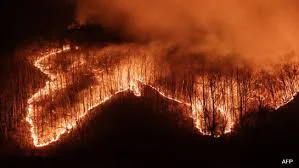South Korea is battling one of its worst wildfire seasons in recent history, with over a dozen blazes erupting across the country, claiming four lives, and forcing thousands to evacuate. The government has declared a state of emergency in four regions, citing "extensive damage" caused by the simultaneous wildfires ¹.
The fires, which started over the weekend, have burned thousands of hectares of land, with the damage expected to make them the third-largest in the nation's history. More than 3,000 people have been evacuated to shelters, and at least 11 people have been seriously injured ¹.
Strong winds, dry weather, and haze are hampering firefighting efforts, with over 6,700 firefighters deployed to battle the wildfires. The government has mobilized all available resources to contain the fires, with nearly two-fifths of the personnel dispatched to Uiseong, one of the worst-affected areas
The economic impact of the wildfires is also a concern, with the tourism sector expected to take a hit. The affected areas are popular tourist destinations, with many natural attractions, including national parks and hiking trails, damaged or inaccessible ².
collectively the third-largest in South Korea's history. The largest was an April 2000 blaze that scorched 23,913 hectares (59,090 acres) across the east coast.
More than 3,000 people have been evacuated to shelters, Ko said. At least 11 people have been seriously injured.
"Strong winds, dry weather, and haze are hampering firefighting efforts," Ko told a disaster and safety meeting.
The government is "mobilising all available resources", he said.
In Uiseong, the sky was full of smoke and haze, AFP reporters saw. Workers at a local temple were attempting to move historical artefacts and cover up Buddhist statues to protect them from possible damage.
The Korea Forest Service said the containment rate for the fire in Uiseong decreased from 60 to 55 percent by Tuesday morning.
More than 6,700 firefighters have been deployed to battle the wildfires, according to the Ministry of Interior and Safety, with nearly two-fifths of the personnel dispatched to Uiseong.
The government declared a state of emergency in four regions, citing "the extensive damage caused by simultaneous wildfires across the country".
Family grave
Some types of extreme weather have a well-established link with climate change, such as heatwaves or heavy rainfall.
Other phenomena, such as forest fires, droughts, snowstorms and tropical storms can result from a combination of complex factors.
In Daegu and the North Gyeongsang region, "the air is extremely dry and strong winds are blowing, creating the risk that even a small spark could quickly spread into a large wildfire", an official from the local meteorological administration said.
The fire in Uiseong was reportedly caused by an individual visiting a family grave.
The person told emergency services:
"I accidentally started the fire while cleaning the grave site," according to local media.
South Korea's acting president confirmed this was likely the case.
"The wildfire is believed to have been caused by an individual who was visiting an ancestral grave and accidentally started the blaze," Prime Minister Han Duck-soo said during a cabinet meeting on Tuesday.
"Most wildfires are caused by human negligence and the public should strictly follow wildfire prevention guidelines," he added.
South Korea's neighbouring Japan was also experiencing wildfires, with hundreds of firefighters battling a blaze in Imabari city of western Ehime region since Sunday.
Another wildfire, which also started on Sunday, was affecting the city of Okayama, burning around 250 hectares and damaging six buildings.
Japan saw the country's worst wildfire in more than half a century early this month. It engulfed about 2,900 hectares — around half the size of Manhattan — and killed at least one person.
The government has pledged to provide support to those affected by the fires, including financial assistance to displaced residents and businesses. The recovery efforts are expected to take several days or even weeks, with the government working to restore essential services and infrastructure
Composed by. Eric Azibataram
Email us @ . ericazibataram24@gmail.com
Contact us via.ericazibataram.websites.co.in
Phone us @. +2348158907496




Comments
Post a Comment